 Petzlover
PetzloverBengal is originated from United States but Sumxu is originated from China. Both Bengal and Sumxu are of same weight. Both Bengal and Sumxu has almost same life span. Both Bengal and Sumxu has same litter size. Bengal requires Moderate Maintenance. But Sumxu requires Low Maintenance
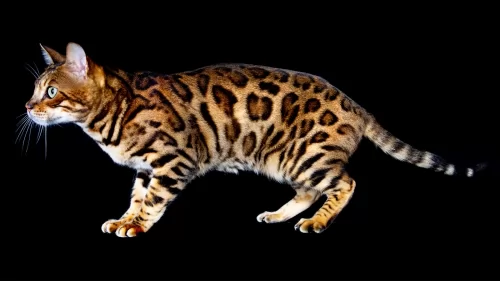 What an exquisite coat the Bengal cat has. It looks like the coat of a wild cat and can have spots, marbling, and rosettes, but it is domesticated, developed from hybrids – the spotted Egyptian Mau and the Asian Leopard cat.
What an exquisite coat the Bengal cat has. It looks like the coat of a wild cat and can have spots, marbling, and rosettes, but it is domesticated, developed from hybrids – the spotted Egyptian Mau and the Asian Leopard cat.
It is the only domestic breed of cat that has rosette markings. It is Jean Mill of California that you associate the Bengal cat with, and she conducted a number of graduate classes in genetics.
The Sumxu is an odd-looking cat with its droopy ears or drop-ears. The truth is, the cat is considered extinct and the last reported Chinese lop-eared cat was way back in 1938.
According to reports, the cat seems to have first made an appearance in 1656 and was always described as a curiosity. It seems as if they were valued as pets but they were also used as food. A Polish man was the first Westerner to describe the Sumxu in his illustrated book Flora Sinensis. The breed was once found in and around Peking and resembled a long-haired Scottish Fold.
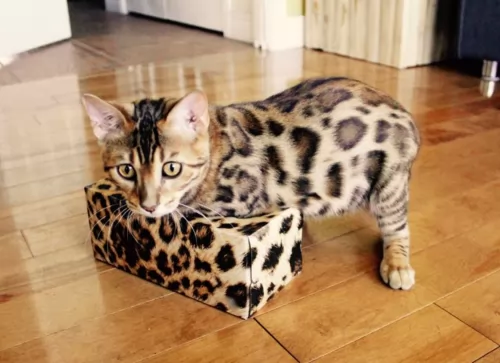 The Bengal looks like a wild cat and it can weigh up to 7kg. It can reach a height of 70cm with long, muscular legs and almond-shaped eyes which are green or blue.
The Bengal looks like a wild cat and it can weigh up to 7kg. It can reach a height of 70cm with long, muscular legs and almond-shaped eyes which are green or blue.
When it comes to the coat of the Bengal cat, it has a wide variety of colors and patterns. The cat can be brown, black, red, grey, spotted, clouded, ticked or rosette.
There are Bengal breeders that claim that their Bengals are hypoallergenic so that they won’t cause an allergic reaction with their owers. This is something that hasn’t been scientifically proved and in fact many will say that there isn’t such as thing as a hypoallergenic cat.
The Bengal is a medium to large-sized cat, being long and lean and muscular. As a low shedder, it is believed the Bengal is a hypoallergenic cat breed – a cat less likely to cause an allergy with its human owners.
When you bring a Bengal cat into your home, you’ll find they are energetic, smart, and playful and they love cavorting around in water.
People who have owned a Bengal say that the cat is friendly and that it enjoys interacting with humans. They’re cats capable of forming strong bonds with their human family, becoming affectionate and loyal. They in turn want to receive lots of loving attention.
They’re intelligent too and are quick to learn. You have to remember that these are part wild cat and that they are only classed as tame from the 4th generation (T4).
The cat has wild traits so it is only natural that it likes to hunt so don’t be alarmed when your Bengal presents you with dead mice, moles, and birds.
The Chinese have always eaten this cat and because it has always been found in restrictive conditions the cat lost its keen sense of hearing because it no longer needed to hunt. The cat's ears lost their upright nature and became the hanging ears that are characteristic of the Chinese cat.
The cat had a long silky, shiny coat and was a dirty yellowy type of color. It had a ruff, a thick tail and blue, slanted eyes. It is thought that the size of the Sumxu was somewhat larger than the standard cat so he would have been a medium to large-sized cat, weighing in the region of 4 to 7kg. He was thick-set and muscular.
It is thought that this cat wasn’t particularly active and that it seems to only become really animated when offered food, preferring to lie beside a warm fire than to be found outside. We can only assume that it was a fairly quiet cat.
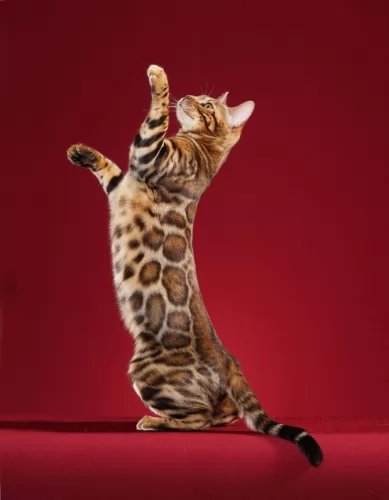 Bengal cats are intelligent and just like a dog he is clever at learning tricks and can even be taught things such as ‘sit’, ‘fetch’ or ‘lie down’. They actually make great companions as they are sensitive to their owner's moods and can even recognize human gestures and adapt their behavior to their owner's mood.
Bengal cats are intelligent and just like a dog he is clever at learning tricks and can even be taught things such as ‘sit’, ‘fetch’ or ‘lie down’. They actually make great companions as they are sensitive to their owner's moods and can even recognize human gestures and adapt their behavior to their owner's mood.
They’re vocal cats too and they like to communicate about their needs, being able to meow in different tones. They’re active cats and they want active owners – those who can spend time with them playing and even going on walks and hikes.
The Bengal certainly is a wonderfully companionable cat.
Not much is known of the character of the Sumxu cat as it is now extinct. It doesn't matter what kind of cat you have because every cat needs to be loved and well cared for. If you can't do that, then why get a cat in the first place.
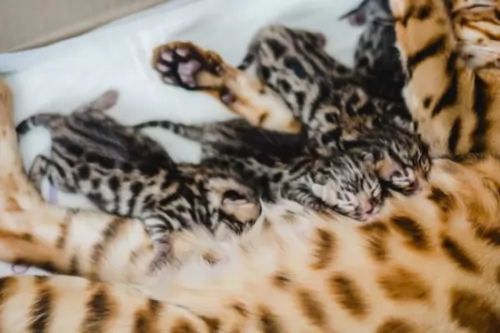 Hypertrophic cardiomyopathy (HCM) is a concern with the Bengal cat breed and this is a disease where the heart muscle becomes thick and unable to pump blood properly.
Hypertrophic cardiomyopathy (HCM) is a concern with the Bengal cat breed and this is a disease where the heart muscle becomes thick and unable to pump blood properly.
It’s a common genetic disease in Bengal cats. Cats used for breeding need to be screened each year to ensure no hypertrophic cardiomyopathy is present.
Another problem with the Bengal cat is Progressive retinal atrophy or PRA. Anyone wanting to breed Bengals should have their cat tested for this eye disease as the disease can lead to blindness.
The Sumxu cat should have seen the veterinarian every year for an examination and to make sure his vaccinations and deworming were up to date.
It is never a good idea to give your cat medication that hasn't been prescribed by the vet. If the Sumxu cat had ingested a poisonous substance, it would have been kind to call the vet. It would have been dangerous for the Chinese to eat such a cat that had ingested poison.
While cats should be spayed and neutered, it is quite possible that the Sumxu cat was eaten before it ever had a chance to become a parent. Neutering and spaying a cat has health benefits for the cat and can prevent cancers.
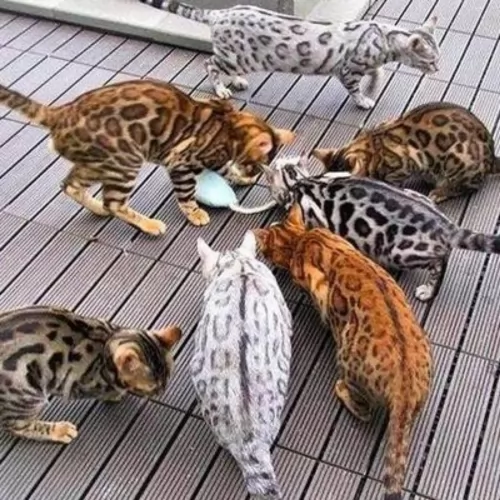 You will need a secured outdoor area for your Bengal cat where he can play and climb. He will need these for his activity levels as well as stimulating toys.
You will need a secured outdoor area for your Bengal cat where he can play and climb. He will need these for his activity levels as well as stimulating toys.
Provide feeding and water bowls and also make sure that you provide your Bengal with a shallow swimming pool as this cat loves water.
The Bengal is a healthy cat breed so it is important to provide your pet cat with the best food there is and to ensure he gets checked out at the vet every year.
Most hybrid breed owners provide raw food as these cats are often sensitive to commercially manufactured food. Having said that, there are high-quality prepared cat foods that will provide your Bengal with everything needed for a healthy life.
Look at providing your pet with a good supplement to ensure your furry friend has every chance to be healthy and happy.
One would have hoped that the now-extinct Sumxu cat received high-quality cat food. If you don't know what to feed your cat, your veterinarian will be able to advise you on the best diet. The cat food manufacturers always produce foods that take into account the cat's age and activity levels.
Certainly, every cat needs taurine, an essential amino acid, for heart and eye health. The food you choose for your cat should contain all the necessary vitamins and minerals.
You will need to provide fresh, cool water for your cat at all times. Wash and refill your cat’s water bowls regularly.
Take your pet to your vet for any signs of illness such as diarrhea, vomiting or lethargy.
The Sumxu cat would have required a brush every few days as the coat was long and silky. Brushing helps keep your cat's coat free of dust and loose hairs.
Your cat will need a litter box which should be placed in a quiet, accessible location. The Sumxu cat would not have liked feces in his litter box, and litter boxes of all cats should be kept clean.